Welcome to VANJOIN. Your satisfaction is our biggest pursuit.
When it comes to selecting the perfect flooring for your home, the choices can seem overwhelming. You may have come across terms like LVP, SPC, and WPC during your research and wondered what they mean. In the world of flooring, these acronyms represent some of the most durable and high-quality options on the market. In this ultimate guide, we will explore the intricacies of Luxury Vinyl Plank (LVP), Stone Polymer Composite (SPC), and Wood Polymer Composite (WPC) flooring. Armed with this knowledge, you can make an informed decision about the best flooring choice for your unique needs. Let’s dive in and unravel the mystery of these popular flooring options.
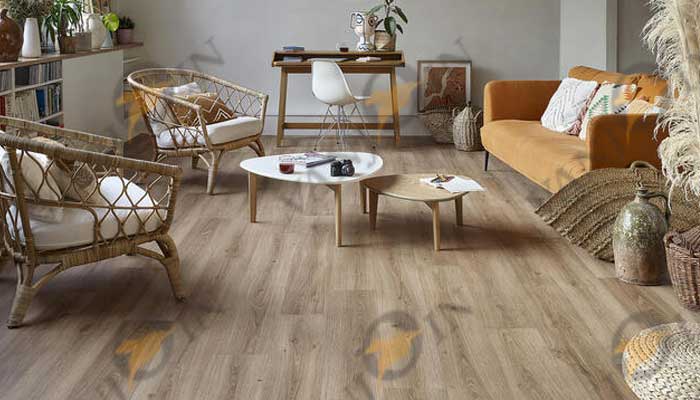
What is LVP (Luxury Vinyl Plank)?
Luxury Vinyl Plank, often abbreviated as LVP, is a type of flooring that closely imitates the look and feel of natural materials like wood or stone. The composition of LVP includes multiple layers of compressed vinyl, topped with a high-resolution image that mimics the desired material. This image layer is then coated with a transparent wear layer that protects the floor from fading, stains, and scratches.
The primary component in LVP is the vinyl core, which provides the planks with both flexibility and durability. This is an essential characteristic as it allows the planks to withstand heavy foot traffic while maintaining their aesthetic appeal.
The Benefits of LVP
One of the main advantages of LVP is its versatility. The high-resolution image layer allows the flooring to look like virtually anything you want, from different types of wood to stone, tile, and more. This offers homeowners the freedom to customize their floors to match their interior decor perfectly.
Another notable benefit of LVP is its durability. The vinyl core of LVP makes the planks not only flexible but also hard-wearing. This means they can withstand heavy foot traffic, making them an excellent choice for busy households and commercial premises.
Finally, LVP is waterproof, making it a practical choice for areas prone to spills and moisture, such as kitchens and bathrooms.
The Drawbacks of LVP
While LVP has many benefits, it’s also important to be aware of its drawbacks. One potential concern is the presence of harmful chemicals in some vinyl products. Therefore, it’s advisable to look for environmentally friendly LVP options that can be recycled at the end of their lifespan.
Another potential downside of LVP is that, despite its durability, it can still be damaged by sharp objects or heavy furniture. Therefore, proper care and maintenance are necessary to keep your LVP floors looking their best.
In conclusion, LVP offers a versatile, durable, and waterproof flooring solution that can mimic the look of various natural materials. However, like any flooring option, it also has its drawbacks. The key is to consider these factors carefully and choose a flooring option that best suits your needs and lifestyle.
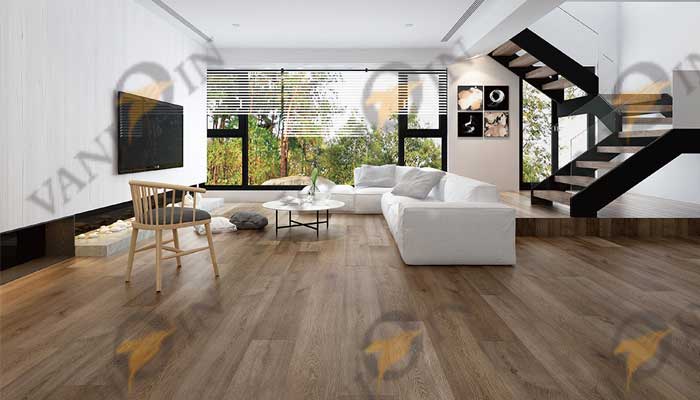
What is SPC (Stone Polymer Composite)?
The Composition of SPC
If you’re looking for a flooring option that’s both aesthetically pleasing and exceptionally durable, Stone Polymer Composite (SPC) flooring is worth considering. SPC is a relatively new addition to the flooring world, but it has quickly gained recognition for its impressive performance.
The composition of SPC flooring is unique. It is a hybrid of compressed limestone powder and plastic, which forms a rigid core. The flooring also has a high-resolution image layer, similar to LVP, which is overlaid onto the vinyl. This layer can mimic the look of various materials, providing a wide range of design options. Finally, SPC is coated with a transparent wear layer that protects the floor from fading, stains, and scratches.
The Benefits of SPC
SPC flooring is known for its extreme durability. It’s more rigid and harder than LVP, making it resistant to dents and other forms of damage. The rigidity of SPC also allows it to provide more support underfoot, making it a suitable choice for high-traffic areas or commercial spaces.
Unlike LVP, SPC flooring does not flex or bend, which means it can maintain its form even over uneven subfloors. This allows you to install SPC flooring on any level, over almost any existing hard surface subfloor, and for any amount of traffic.
Another significant benefit of SPC flooring is its waterproof nature. Thanks to the solid, waterproof core, this type of flooring can be used in areas prone to moisture, such as kitchens, bathrooms, or basements, without worrying about water damage.
The Drawbacks of SPC
Despite its numerous benefits, there are a few drawbacks to SPC flooring. One notable disadvantage is its hardness. While this contributes to its durability and stability, it can also make the flooring feel less comfortable underfoot compared to LVP. This might not be ideal for areas where you spend a lot of time standing, like the kitchen.
SPC flooring is also typically more expensive than vinyl due to its rigid, composite construction. While it’s still more cost-effective compared to options like wood, stone, or tile, those on a tight budget might prefer the more affordable LVP.
In conclusion, SPC flooring presents a robust and durable flooring option, providing a balance between aesthetics and performance. Its main strengths lie in its durability and water resistance, which makes it suitable for a wide range of applications. However, the comfort and cost factors are worth considering before making a decision.
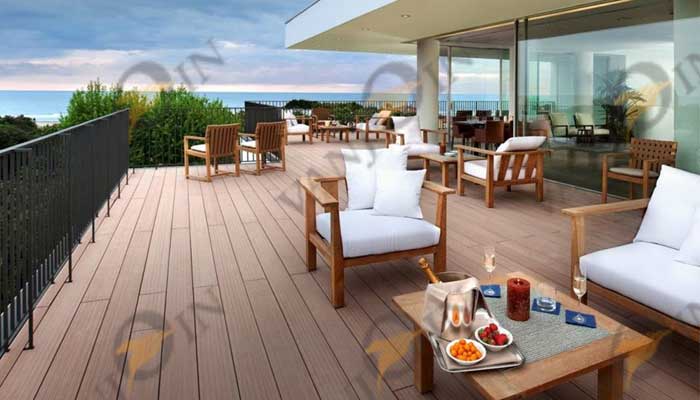
What is WPC (Wood Polymer Composite)?
As we venture further into the realm of innovative flooring options, we encounter another heavyweight contender: Wood Polymer Composite, commonly known as WPC. This type of flooring offers a unique blend of comfort and durability that sets it apart from the rest.
The Composition of WPC
WPC flooring is an advanced version of luxury vinyl flooring that comprises multiple layers. At its core, WPC flooring contains a concoction of polyvinyl chloride, plasticizers, calcium carbonate, and wood-like materials or actual wood, such as wood or bamboo flour. Some manufacturers are shifting towards using various wood-like plasticizers, replacing the original wood components. This core is then protected by a printed vinyl layer that showcases the alluring photo imagery of wood or stone, a feature that has made vinyl a popular alternative to natural materials. The topmost layer is a wear layer that serves to protect the flooring surface from the inevitable wear and tear of daily life.
The Benefits of WPC
One of the main selling points of WPC is its complete waterproof nature. Whether it encounters spills from above or moisture from below, WPC vinyl assures you of a flooring solution that won’t swell, stain, or warp. This makes it a fitting choice for areas prone to water exposure, such as bathrooms and kitchens.
In addition to its waterproof nature, WPC flooring offers excellent comfort. Unlike hard flooring options like stone or SPC planks, WPC is resilient and provides a much more comfortable underfoot experience. This makes it an ideal choice for areas where standing for extended periods is common.
WPC flooring also boasts an easy DIY installation process, thanks to many options coming equipped with interlocking tongue-and-groove systems that can float over your existing floor. Moreover, WPC flooring maintains its good looks with minimal maintenance; a simple sweep and mop now and then should suffice.
The Drawbacks of WPC
While WPC flooring offers a host of benefits, it’s important to consider the potential drawbacks. Compared to its SPC counterpart, WPC is slightly less durable due to its softer core. While this contributes to its comfortable feel, it also makes the flooring more susceptible to dents, particularly when heavy items are dropped on it.
Another factor to consider is the cost. WPC flooring tends to be slightly more expensive than SPC flooring. However, the good news is that WPC flooring prices are gradually decreasing, making it a more affordable option. Plus, when compared to solid hardwood, WPC still remains a less expensive alternative with considerably less maintenance.
As you navigate your flooring options, understanding the specifics of each type can help you make an informed decision. As we’ve seen, WPC offers a blend of comfort and durability, making it a viable option for various applications. However, like any other flooring choice, it comes with its own set of compromises. The key is to weigh these factors against your specific needs and preferences to find the perfect flooring solution for your space.
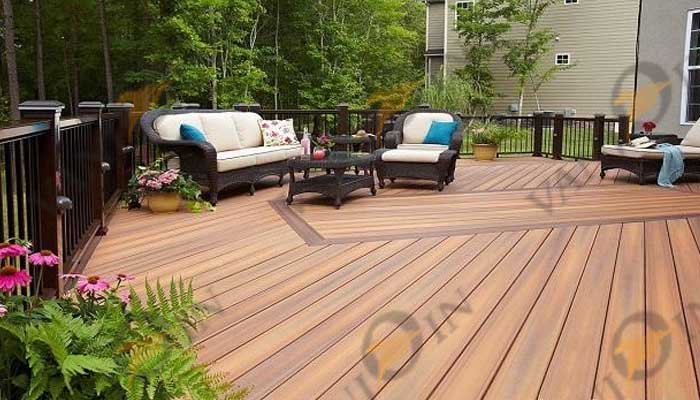
Comparing LVP, SPC, and WPC: Key Differences
When it comes to LVP vs SPC vs WPC, understanding the key differences can help you make an informed decision. Let’s delve into these differences, focusing on core material, durability and stability, comfort and feel, and price.
Core Material Differences
The core material is the heart of any flooring product. It determines the stability, durability, and comfort of the flooring. LVP (Luxury Vinyl Plank) has a core made of flexible PVC, giving it a certain pliability. On the other hand, SPC (Stone Polymer Composite) is a blend of plastic and compressed limestone powder, resulting in a rigid, sturdy core. WPC (Wood Polymer Composite), despite its name, does not contain wood but rather has a core composed of wood plastic composite, offering a balanced blend of sturdiness and flexibility.
Durability and Stability Comparison
In terms of durability, all three—LVP, SPC, and WPC—are resilient, but they offer varying degrees of stability. SPC, with its limestone core, is most stable, particularly under temperature changes and high heat. Moreover, due to its dense core, SPC is less likely to dent, thus making it more durable. LVP, although flexible, is sturdy and more dimensionally stable than traditional LVT (Luxury Vinyl Tile), but may not hold up well to dents and wear. WPC, with its unique composite core, offers moderate stability and durability.
Comfort and Feel Comparison
When it comes to comfort, the pliability of LVP gives it a softer, more comfortable feel underfoot. WPC, on the other hand, offers a cushioned underfoot due to its thick padding, providing both softness and quietness. Although SPC’s rigid core offers solid support underfoot, it may not provide the same level of comfort as WPC, especially for prolonged standing or walking.
Price Comparison
Price is a significant factor when choosing flooring. Despite their similarities, there’s a price difference among LVP, SPC, and WPC. SPC, with its rigid composite construction, tends to be more expensive than LVP. Although WPC is similar to SPC in many aspects, it is typically more costly due to its unique composite core and cushioned underfoot feel. LVP is often the most cost-effective option among the three, making it a great choice for those on a tight budget.
In conclusion, the best flooring choice depends on your specific needs and preferences. Consider the differences in core material, durability, comfort, and price when comparing LVP, SPC, and WPC to ensure you make an informed decision.
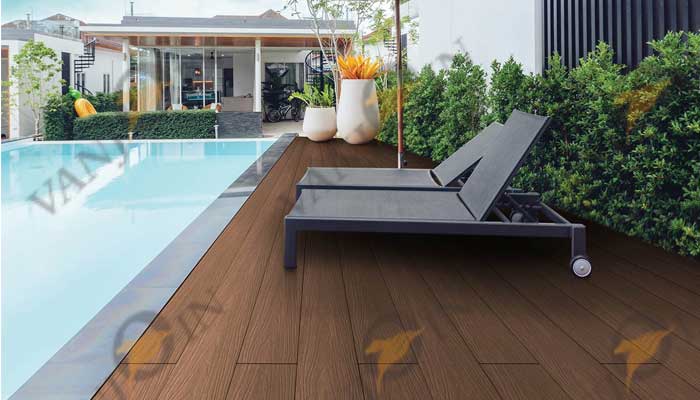
Choosing the Right Flooring: LVP, SPC, or WPC?
Selecting the right flooring can seem like a daunting task with the variety of options available in the market. From Luxury Vinyl Plank (LVP) to Stone Polymer Composite (SPC) and Wood Polymer Composite (WPC), each type has unique characteristics that might cater to different needs. Here, we’ll help you determine the best fit for your home or business, factoring in various aspects such as durability, cost, maintenance, and application area.
Factors to Consider When Choosing Flooring
When considering your flooring options, keep in mind the following key factors:
1. Durability: Evaluate the expected foot traffic and wear and tear. SPC and WPC offer superior durability compared to LVP.
2. Cost: Budget is a crucial factor in your decision. LVP is typically the most affordable option.
3. Maintenance: All three options are relatively low maintenance, requiring regular sweeping and occasional deep cleaning.
4. Environment: If your space is subject to temperature fluctuations, SPC is the most stable choice due to its limestone core.
5. Comfort and Feel: WPC and LVP are softer and more comfortable underfoot compared to the more rigid SPC.
Best Flooring for Residential Use
When it comes to residential spaces, WPC and SPC floors are generally more suitable. These are floated floors that can be installed above and on grade, making them ideal for various areas in your home, including bathrooms and kitchens. Despite being temperature sensitive, LVP can still be used successfully in residential settings due to its affordability and ease of installation.
Best Flooring for Commercial Use
For commercial spaces, LVT vinyl is the top contender. This flooring type adheres directly to the floor, making it capable of withstanding high traffic volumes. However, for commercial spaces with less foot traffic, hybrid flooring options such as WPC and SPC could be suitable.
Ultimately, the choice between LVP, SPC, and WPC flooring depends on your specific needs and preferences. From durability to cost and maintenance, each type brings its unique advantages. We recommend consulting with an experienced professional from a reputable company like Vanjoin to ensure you make the best decision for your space.
Conclusion: Making the Best Flooring Choice for Your Needs
Deciding between LVP, SPC, and WPC flooring can seem like a daunting task. Each material has its unique traits and potential benefits, but the best choice always comes down to your specific needs, lifestyle, and budget. Whether you’re after the realistic textures and durable nature of LVP, the exceptional stability and waterproof features of SPC, or the warm, comfortable feel of WPC, understanding the characteristics of each can guide you in making an informed decision.
Remember, the right flooring can significantly enhance the appeal and value of your home, while also contributing to a healthier living environment. It’s more than just a surface to walk on – it’s an integral part of your home’s design, an investment in its value, and a reflection of your lifestyle.
In the end, the best flooring choice is the one that meets your specific needs and complements your home’s aesthetic. Whether that’s LVP, SPC, or WPC, you can trust Vanjoin to provide the highest quality materials, skilled installation, and top-notch customer service. We’re here to help you every step of the way in making the best flooring choice for your home.
Got a question, comment or business enquiry? We are always happy to hear from you.